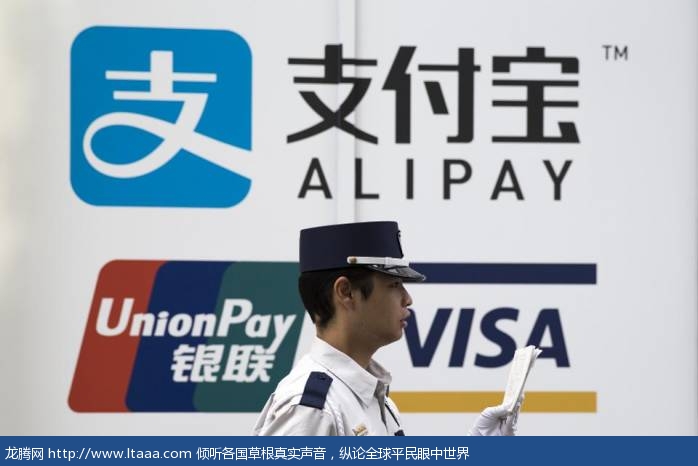中国央行正如何收紧移动支付行业 [美国媒体]
对于李秀洙来说,中国的无现金付款是改变终身的。这位22岁的韩国学生在上海暑期实习后,将她日常生活中的每一个环节都与智能手机挂钩。 “我在中国只担心手机是否有电,”李说。 “一台手机足以支付日常开支,从打车到订购食物。”
How China's Central Bank Is Clamping Down On The Mobile Payment Industry
中国央行正如何收紧移动支付行业
To Jee Soo Lee, China’s cashless payments are life-changing. The 22-year-old Korean student has seen every aspect of her daily life tied to her smartphone after a summer internship in Shanghai. “I only worry whether I have enough battery in China,” says Lee. “One mobile phone is sufficient for everyday expenses, from hailing a taxi to ordering food.”
对于李秀洙来说,中国的无现金付款是改变终身的。这位22岁的韩国学生在上海暑期实习后,将她日常生活中的每一个环节都与智能手机挂钩。 “我在中国只担心手机是否有电,”李说。 “一台手机足以支付日常开支,从打车到订购食物。”
With mobile payments, 40% of China’s population get around carrying less than 100 RMB cash ($15), according to a report produced by Tencent, Renmin University of China, and research company Ipsos.
根据腾讯,中国人民大学和益普索研究公司的报告,随着移动支付发展,40%的中国人携带不足100元现金(15美元)
Unlike in the U.S., where bank-issued credit cards are behind most cashless transactions, mobile payment services in China are dominated by Internet behemoths, like Tencent and Alibaba-backed Ant Financial, taking respectively 40% and 54% of the third-party mobile payment market, based on data by iResearch. To tackle this unprecedented industry, financial regulators are scrambling to catch up.
不同于在美国,大部分无现金交易采用银行发行的信用卡,中国的移动支付服务主要由腾讯和阿里巴巴支持的蚂蚁金融等互联网巨头垄断,基于iResearch的数据,他们分别占第三方移动支付市场的40%和54%份额。为了管理这个前所未有的行业,金融监管机构正在奋力赶上。
Bigger Market, Stronger Regulations
更大的市场,更强的法规
The Payment and Clearing Association of China reveals that the transaction volume of non-banking payments grew to almost RMB 100 trillion ($15 trillion) in 2016, increasing twofold from 2015. The number of third-party mobile payment users increased to 469 million in 2016, which is about 70% of China’s mobile user base.
中国支付结算协会透露,2016年非银行支付交易额达到近100兆元人民币(15兆美元),比2015年增长了两倍。第三方手机支付用户数量在2016年上升到4.69亿,约占中国手机用户的70%。
The staggering rise warrants increasing oversight. “The regulation for non-banking payments was relatively loose in the previous years in order to support the innovative industry,” says analyst Wang Pengbo at research firm Analysys. “As it is growing much bigger, the central bank is taking more control.”
惊人的增长值得越来越多的监督。研究公司Analysys分析师王鹏波表示:“前几年的非银行支付规定相对较宽,以支持创新产业。 但随着它发展越来越大,中央银行正在采取更多的控制措施。”
Recent Controversies & Central Bank’s Reaction
最近的争议和中央银行的反应
China’s dwindling use of cash also causes unforeseen issues, particularly for visitors. Lee recalls that, upon arriving in Shanghai, she couldn’t use cash to buy a public transportation card in two metro stations, which accepted only mobile payments or Chinese bank cards. “Foreigners staying for a short while may be frustrated by the problem,” says the 22-year-old.
中国日益减少的现金也造成了不可预见的问题,特别是对访客。李回忆,到达上海时,她不能用现金在两个地铁站购买公共交通卡,只接受手机付款或中国银行卡。这位22岁的女士说:“逗留一段时间的外国人可能会对这个问题感到沮丧。“
It is also an obstacle for those who aren't accustomed to fast-moving technology, like the elderly. In early August, the top two players in the field, Ant Financial (which owns Alipay) and Tencent (owner of Tenpay), promoted the idea of cashless society and distributed large rewards to customers and shops using their platforms. During the marketing campaigns, some merchants rejected cash as payment, arousing complaints from customers.
对于那些不习惯技术快速进步的老人而言,这也是一个障碍。 8月初,该领域的前两名玩家,蚂蚁金融(拥有支付宝)和腾讯(拥有财付通),推广了无现金社会的理念,并通过平台向客户和商店分发了大量奖励。在营销活动中,部分商家拒绝支付现金,引起客户投诉。
The central bank soon deemed the refusal of RMB illegal. Amid the controversy, Ant Financial and Tencent quietly removed the word “cashless” from their promotion materials.
中央银行很快就认为拒收人民币违法违约。在争议中,蚂蚁金融和腾讯悄悄地从宣传材料中删除了“无现金”一词。
Centralizing Clearance by June 2018
集中清关到2018年6月
On August 4th, the People’s Bank of China (PBoC) mandated that mobile payment groups must channel payments through a new clearing house by next June. Central bank-affiliated institutions are the largest shareholder (35%) of this newly established China Nets Union Clearing Corporation. Alipay and Tenpay account for 10% each, according to Chinese news media Caixin.
8月4日,中国人民银行(PBoC)规定,移动支付集团必须在明年6月之前通过新的票据交换所结进行支付。中央银行下属机构是新成立的中国网联结算公司的最大股东(35%)。根据中国新闻媒体财新,支付宝和财付通各占10%。
Until recently, information about capital flow was tightly guarded by third-party payment companies and was only used for targeted marketing and credit scoring, which bypassed the regulator. “The central bank aims at placing the non-banking transactions under supervision to avoid potential money laundering and other illegal practices.” says Wang.
直到最近,有关资本流动的信息受到第三方支付公司的严格保密,仅用于有针对性的营销和信用评分,这也绕过了监管机构。 王说:“中央银行的目标是将非银行业务交易进行监督,以避免潜在的洗钱和其他违法行为。”
This order is likely to reshape the industry. Not only would it reduce the operating costs and repetitive investment on infrastructure, but also it would require Tenpay and Alipay to disclose valuable data to the government and competitors, both benefiting smaller payment providers.
这个命令很可能重塑行业。它不仅可以降低运营成本和对基础设施的重复性投资,而且还需要财付通和支付宝向政府和竞争对手披露有价值的数据,从而使较小的支付提供商受益。
Handing in Reserve Funds
递交储备金
Beginning in April, third-party payment groups are required to allocate on average 20% of their total reserve funds under centralized management of the PBoC, which pay no interest. This percentage will gradually increase to 100% over time.
Reserve funds are prepaid sums from buyers that are held temporarily by payment companies during a 3 to 7-day clearing period, with which payment providers can charge interest and grow their business. The total amount of reserve funds reached nearly RMB 500 billion ($75 billion) by end of 2016, according to market research firm TrendForce.
从4月份开始,第三方支付集团必须在中央人民银行集中管理下平均分配其20%的总储备金,这不用负利息。这个比将逐渐增加到100%。
储备金是由支付公司在3至7天结算期间临时持有的买家的预付款项,支付提供者可以向买家收取利息并开展业务。据市场研究公司TrendForce公布,截至2016年底,储备金总额达到近5000亿元人民币(约合750亿美元)。
Previously the PBoC had no direct visibility into the funds, and thus payment firms could potentially misuse their clients’ money. “This move will help the central bank to understand how much capital these giant companies possess and to reduce risks of financial fraud,” says Wang.
以前,人民银行没有直接了解资金,因此支付公司可能会滥用客户的资金。 “这一举措将有助于中央银行了解这些巨头公司拥有多少资金,并减少金融诈骗的风险。”王说。
Meanwhile, China has also permitted traditional banks to use quick response (QR) code scanning to process mobile payments, which allows the established banks to seize part of this expanding market.
同时,中国也允许传统银行采用快速反应(QR)代码扫描来处理流动支付,这样可以使成熟的银行占据这个不断扩大的市场的一部分
Policy Outlook
政策展望
Competition in this field is likely to increase, as the central bank acts to counter a growing oligopoly. Although this might curtail the big names’ revenue in the short run, a more “transparent and well-regulated” industry is expected, according to analyst Jia Mo at research firm Canalys.
随着中央银行反对加剧的寡头垄断的措施,这一领域的竞争可能会增加。研究公司Canalys分析师贾莫表示:尽管这可能在短期内缩小了行业龙头的收入,但预计会有一个“更透明和管理更好”的行业。
“The keynote of regulation is still tolerant and supportive of the mobile payment industry,” Analysys’ Wang says. “There is no reason for the government to reject, as mobile payments are fundamentally changing the infrastructure of commerce and are supporting the growth of GDP.”
“监管的基调还是宽容和支持移动支付行业,”分析师王说。 “政府没有理由拒绝,因为流动支付从根本上改变了商业基础设施,并且正在支持GDP的增长。”
版权声明
我们致力于传递世界各地老百姓最真实、最直接、最详尽的对中国的看法
【版权与免责声明】如发现内容存在版权问题,烦请提供相关信息发邮件,
我们将及时沟通与处理。本站内容除非来源注明五毛网,否则均为网友转载,涉及言论、版权与本站无关。
本文仅代表作者观点,不代表本站立场。
本文来自网络,如有侵权及时联系本网站。
图文文章RECOMMEND
热门文章HOT NEWS
-
1
Why do most people who have a positive view of China have been to ...
- 2
- 3
- 4
- 5
- 6
- 7
- 8
- 9
- 10
推荐文章HOT NEWS
-
1
Why do most people who have a positive view of China have been to ...
- 2
- 3
- 4
- 5
- 6
- 7
- 8
- 9
- 10











